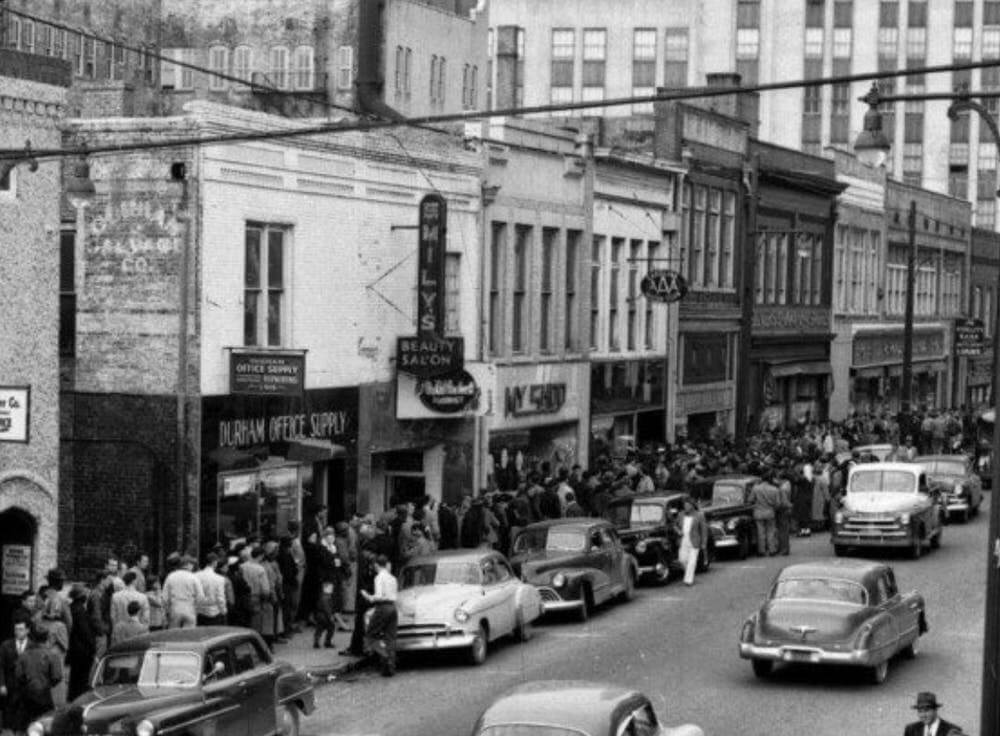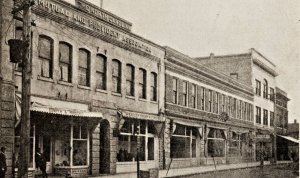"We would be remiss to not identify that, before the term 'entrepreneurial ecosystem' was coined, Black communities were building them."
Deryle Daniels
Born at what was then Durham Regional Hospital in the 1980s, I have seen my city go through numerous paradigm-shifting changes. What was once one of the nation’s many great Black Wall Streets, over the last decade and a half, like so many other under-resourced metropolitan areas, Durham is going through an identity crisis.
With claims of being progressive, cities like Durham seek the aesthetic of urban culture — from murals of Black/Indigenous/People of Color on exterior walls to raw brick apartments decorated with turntables that spin hip-hop classics daily. Whereas artistic aspects of The Culture are embraced, many often overlook the economic infrastructure and business acumen that allowed for such astounding art to have the luxury of being discovered and to, ultimately, thrive.

Durham’s Black Wall Street. Photo courtesy of Black Then: Discovering our History.
Without the Greenwood Districts (Oklahoma) and the Hayti Communities (North Carolina), the Jackson Wards (Virginia) and the Fourth Avenue Districts (Alabama), the Boleys (Oklahoma) and the numerous other unsung, interrupted, independently-stable Black sections of towns, this nation would lack both its financial foundation and its creative credibility. Ironically, even the name of the most famous spirited drink in America would not be worth much were it not for a Black man’s recipe. But, as is often the case, Black culture, Black inventions, Black land, and Black dollars have been retrieved, repackaged, and repriced to keep us away from that which we openly shared without reciprocity or reparation.
As Forward Cities honors the legacy of Black entrepreneurs across history, we would be remiss to not identify that, before the term “entrepreneurial ecosystem” was coined, Black communities were building them. At a time when equality was the only goal and equity was so far fetched that it hadn’t been integrated into the language of a society more segregated than east is from west, Black business leaders like John Merrick, Charles Clinton Spaulding, and Dr Aaron. M. Moore founded what is America’s longest, largest standing Black-owned life insurance company, the N.C. Mutual Life Insurance Company. Over the past few decades, its financial footprint has lessened but its impact is nothing shy of great. Growing up in church with these families and developing friendships with their legacies, I was exposed to stories of Black greatness that made stories of tycoons like J.P. Morgan and John Rockerfeller sound like fairy tales, because, in comparison, they were. The obstacles that these men and women faced were orchestrated by everyone from everyday citizens (such as the KKK) to the government, which used Highway 147 to physically divide the Hayti Community by design, weakening Durham’s Black unity at a time when it was most needed.

The NC Mutual Life Insurance Company Building. Photo courtesy of RAL Today.
This story is one of thousands like it from every state that would let us operate businesses within it (to learn more, check out “The Racist History of Portland, the Whitest City in America” to read how far certain states, municipalities, and neighborhoods would go to keep Black people and businesses from thriving). So, as you look at Black History Month, look at it from a lens of reinvestment. Whether you’re choosing to donate to support Forward Cities’ mission and support equity for every entrepreneur or you just decide you want to spend dollars at Black retailers and eateries, know that honoring the legacy of Black excellence without investing in the future of Black excellence only inflates egos and doesn’t encourage equity.
Over the next two years, Forward Cities will be leading an effort in Durham to support marginalized entrepreneurs. We encourage you to support these entrepreneurs by patronizing their businesses whenever you are able. Black History Month is a time when Black entrepreneurs across the nation feel supported by so many in their respective communities, only to be reminded in subsequent months that the support was more of a moment than a movement. This year, I challenge you to change that by supporting these businesses year round.
I wish you all an impactful Black History Month, full of genuine appreciation as opposed to glorified appropriation. To learn more about what we will be doing in Durham in 2022 and beyond, visit our E3 Durham page.
About the Author
Deryle Daniels
Deryle Daniels is the Senior Manager of Marketing & Communications at Forward Cities and the owner of Daniels Development & Branding, LLC. A native of Durham, Deryle received his bachelor’s degree from the University of North Carolina at Greensboro, where he currently serves on the Board of Directors for the Bryan School of Business & Economics as well as for the general University. Deryle has over a decade of experience in the fields of marketing, communications, and fundraising focused on working with small businesses, nonprofits, and educational institutions.
